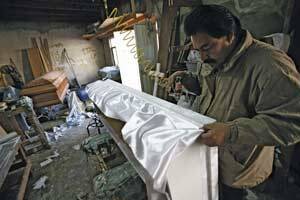Instead of quelling the violence in the border community of Ciudad Juárez, the posting of almost 13,000 Mexican troops and federal police officers has only accelerated the bloodletting, even as it has introduced new problems of corruption and human rights abuses. So says one Mexican pastor and human rights activist about the vast expansion of the Mexican military’s role in confronting drug cartel violence and petty crime in this city of 1.3 million residents.
“The statistics don’t lie,” said the Rev. Oscar Enríquez, pastor of Holy Spirit Parish, which serves a neighborhood of low-wage factory workers on the southern outskirts of town. “The number of homicides has increased. Kidnapping has increased. Extortion has increased throughout the city.” Ciudad Juárez, he said, “continues being a city kidnapped by organized crime.” Father Enríquez’s unfavorable assessment of the military and police presence has become more common in Ciudad Juárez. Violence attributed to warring cartels, crimes committed by gangs affiliated with the cartels and a federal crackdown have claimed an estimated 800 lives in Ciudad Juárez this year and more than 4,000 since President Felipe Calderón took office in December 2006.
Equally disquieting for Father Enríquez, who is also the director of the Paso del Norte Human Rights Center, has been the growing number of allegations of human rights abuses—ranging from extortion to illegal raids to forced disappearances—against the military and Federal Police. Mexico’s National Human Rights Commission reported 3,388 complaints of military abuse nationwide from 2007 to 2009.
The abuses and rising death toll have fueled perceptions in Ciudad Juárez—a key transit point for drugs heading north and guns moving south—that the military is ill-equipped to take on the cartels and perform police work. “The military option was a disaster,” said Gustavo de la Rosa Hickerson, former investigator for the Chihuahua State Human Rights Commission. “It was totally ineffective for ending the violence, and those causing the violence seized control of the city.”
De la Rosa previously investigated allegations of abuse against soldiers and police in Ciudad Juárez but relocated to neighboring El Paso, Tex., after he received death threats and his safety could not be guaranteed. The federal government has started replacing the military with 5,000 Federal Police officers, a move de la Rosa supports because soldiers, he said, enjoy “impunity.”
Still, de la Rosa said the transition has had its problems: 18 officers were detained in just one month for crimes like abuse of authority, theft and extortion. Eder Garnica Durón, 15, a resident of Ciudad Juárez, said federal officers detained him in the street and, after finding nothing of value on him, dumped him in a vacant lot about three miles from his home. “They come through my neighborhood looking for bribes,” he said. Local police can be just as bad. Officers once detained him and stole the weekly pay package of $70 he had just received from a carpentry workshop.
The federal government has announced plans to transfer the responsibility for security in the state of Chihuahua away from the military and to focus on social problems in the region—a strategy unveiled after a massacre on Jan. 31 killed at least 15 youths at a party. Father Enríquez endorsed the new approach. “We’re convinced that it is not a policy of force that will resolve a local problem,” he said.








